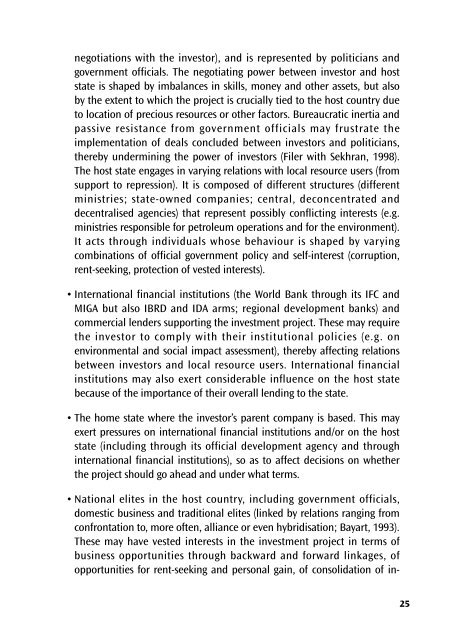Legal empowerment for local resource control
Legal empowerment for local resource control
Legal empowerment for local resource control
You also want an ePaper? Increase the reach of your titles
YUMPU automatically turns print PDFs into web optimized ePapers that Google loves.
negotiations with the investor), and is represented by politicians and<br />
government officials. The negotiating power between investor and host<br />
state is shaped by imbalances in skills, money and other assets, but also<br />
by the extent to which the project is crucially tied to the host country due<br />
to location of precious <strong>resource</strong>s or other factors. Bureaucratic inertia and<br />
passive resistance from government officials may frustrate the<br />
implementation of deals concluded between investors and politicians,<br />
thereby undermining the power of investors (Filer with Sekhran, 1998).<br />
The host state engages in varying relations with <strong>local</strong> <strong>resource</strong> users (from<br />
support to repression). It is composed of different structures (different<br />
ministries; state-owned companies; central, deconcentrated and<br />
decentralised agencies) that represent possibly conflicting interests (e.g.<br />
ministries responsible <strong>for</strong> petroleum operations and <strong>for</strong> the environment).<br />
It acts through individuals whose behaviour is shaped by varying<br />
combinations of official government policy and self-interest (corruption,<br />
rent-seeking, protection of vested interests).<br />
International financial institutions (the World Bank through its IFC and<br />
MIGA but also IBRD and IDA arms; regional development banks) and<br />
commercial lenders supporting the investment project. These may require<br />
the investor to comply with their institutional policies (e.g. on<br />
environmental and social impact assessment), thereby affecting relations<br />
between investors and <strong>local</strong> <strong>resource</strong> users. International financial<br />
institutions may also exert considerable influence on the host state<br />
because of the importance of their overall lending to the state.<br />
The home state where the investor’s parent company is based. This may<br />
exert pressures on international financial institutions and/or on the host<br />
state (including through its official development agency and through<br />
international financial institutions), so as to affect decisions on whether<br />
the project should go ahead and under what terms.<br />
National elites in the host country, including government officials,<br />
domestic business and traditional elites (linked by relations ranging from<br />
confrontation to, more often, alliance or even hybridisation; Bayart, 1993).<br />
These may have vested interests in the investment project in terms of<br />
business opportunities through backward and <strong>for</strong>ward linkages, of<br />
opportunities <strong>for</strong> rent-seeking and personal gain, of consolidation of in-<br />
25

















